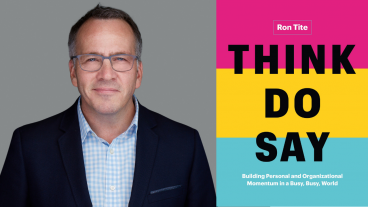Too often, companies overlook a vast source of innovation — their own people. Through her concept of “onlyness”, Nilofer Merchant is seeking to revolutionize work as we know it by empowering people to embrace their unique experiences, potential, and purpose, and showing leaders how to use this previously untapped pool of talent.
A renowned business strategist and innovator, Nilofer recently wrote an article for Harvard Business Review on a phenomenon occurring in companies worldwide — 75% of available talent is simply walking out their door because their being asked the wrong questions and being evaluated on the wrong criteria.
Nilofer drew on her recent experience involving a company where she had helped develop a platform. Having worked on the product, she suggested a job candidate, Anand, whom she knew had the skills and experience they were looking for. However, after meeting with him, they told Nilofer he was not the right fit: “He asked us a ton of questions that the team didn’t have the answers to.”
Anand on the other hand told Nilofer that the interview went really well, and that he even felt comfortable asking more questions than usual so he could understand the complexity of the challenges that the company is facing. After speaking with both of them, Nilofer understood that Anand being a “bad fit” was actually code for “I don’t want to feel uncomfortable.” It is this feeling though that is often at the root of innovation, she explains.
Innovation requires not knowing long enough to learn new things. How can you build something new, if you aren’t okay with not already knowing the answer? The future is not created; it’s co-created. Leaders need to build teams that can both define the right questions, and then discover new answers.
After breaking down the interview with Nilofer, the company realized their mistake and hired Anand because he was the right fit, not only because he had the right qualifications, but also because he had the capability to help that organization continue to grow, innovate, and succeed.
To avoid this situation in the future — where a perfectly good candidate is dropped because they were evaluated on the wrong criteria — Nilofer provided three questions that are essential in helping organizations to hire well.
Questions that uncover capabilities, not just experience. Are you asking questions that get to someone’s capabilities or are you seeking confirming data that someone has done exactly what you have already scoped? Several years ago, a colleague asked if I’d review their job description for a social media “expert.” Twitter had been around for maybe a year at this point and when I looked at the description, I just started laughing. The first line read “10 years of experience.” Quite often, we use useless metrics to scope a job to do what has already been done. The upside of asking for years of experience is we get someone who has done what we need. The downside is we risk limiting what we can create next by doing what has already worked. Instead of asking, “Have you done x or y or z?” you want to ask, “How would you approach doing x or y or z?” This shift in question lets you learn someone’s capacity to think with you.
Unfortunately, right now, an estimated 77% of all jobs (60% in the U.S. and 80% worldwide) require little to no creativity, decision-making, or independent judgment. But if you are working on innovation, you need someone who can think with you. And by focusing on capability over experience, you increase the chances you find that person.
Questions that assess whether they can co-create on a team. When I ask the teams I’ve worked with in the last 10 years why their last major strategic effort failed, they rarely mention that the team didn’t get along. But they do say that there were cracks in the team — roles that weren’t being filled — and no one was able to step in to fill them. Because the world changes quickly, the work does too and teams can’t stay in their predetermined roles. Teams need to figure out new terrain together. You might ask candidates, “How would you handle a situation where it’s become clear that there is a gap on your team?” Interviewees are often told to use “I” to get credit for work done, but “we” is probably a more realistic depiction of how work gets done. Then follow up to learn how they felt about the situation: Were they proud of catching the gap? Concerned that it existed in the first place? This will help you see if you are dealing with a team player or a know-it-all. You want to find people who can play together, filling in the gaps between predefined roles to get the work done.
Questions that uncover the kinds of things they love to work on. If you’re hiring for innovation, you need to ask what this person authentically brings to work. Ideas, after all, are not invented and grown in a vacuum; they grow and evolve by connecting previously separate elements. Figuring out what people genuinely care about lets you put people together who don’t have the same approaches but who want to reach the same goal. It’s that connection where innovation happens. But people need to be united around a shared purpose and focused on something that has meaning to them. Ask candidates, “What did you find meaningful about that project? What does that particular success say about what matters to you?” People want to match their purpose to the organizations they work for. And it’s your job as the leader to align that purpose so that seemingly disparate people can come together into an “us” headed in the same direction.
Called a “visionary” by CNBC, Nilofer Merchant’s TedTalk “Got a Meeting? Take a Walk” ranks in the top 10 per cent in the world. She’s been invited to hundreds of leadership events by prestigious organizations including Google, Gartner, and GE and has headlined alongside Malcolm Gladwell, Simon Sinek, Arianna Huffington, and other inspirational individuals.
Through her keynotes, she reveals new ways of connecting our ideas to the world, and empowers leaders to unlock the vast source of innovation too often overlooked in their own people.
Interested in learning more about Nilofer and what she can bring to your next event? Email us at [email protected].



